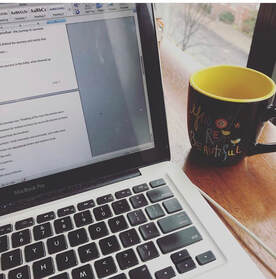 I’m sitting at the one table I have in my home with serves as my desk, craft table, and occasional dinner table. It overlooks a rather usually busy street but on this Saturday morning, only a few are out. Joggers, one lady to whom I want to yell out of the window that she doesn’t have to feed the meter on today, someone walking their dog. I imagine streets are like this everywhere. Everything is changing, in rapid time, for all of us: when and how we work, where and how our children learn, how churches and religious institutions lead worship. Our grocery shopping. Our staying in. Our social distancing. It’s easy to get caught up in the panic and angst. How will we care for ourselves and each other? How will we be able to change, on the drop of a dime, our lifestyles and schedules? How do we manage now with different pay schedules, if there is pay at all? How do we work remotely or in isolation when our work is centered around participants, audiences, community? Every industry is being hit hard, and without much warning. For artists and small arts organizations, the idea of a “slush fund” or cushion is just that – an idea. And so it is only natural that we react and try and fix and go into overtime to prepare for what remains a precarious situation. But, I want to remind you – artists and arts organizations—of what you already know, of the muscles you’ve already been developing. In face of change (funding, patrons removal of support because they didn’t like the last performance, hard choices), you have been agile, responsive, and resilient. Though this is a bigger, global change in which the full impact is yet to be known. We’re knocked off course. We cannot make forecasts and predictions. We’re not sure of what we need to do or who we will be when we come out of this storm. Yet, we move forward. Somehow, we everything we have learning on our journey so far, and with all of our hope, determination, and creativity, we take one day at a time with the hope that we’re all in this together, moving forward towards something better. I was asked a few days ago what I thought we should do as artists in the midst of this pandemic. I know enough as an artist to say that it’s up to the individual to figure that out. But here’s what I would like to offer to one of the largest groups who thrives in the midst of change, and one of the largest groups that will be affected by this-- Take this time to take care of yourself – your inner space from which your creativity rests and runs. It’s okay to rest. You don’t always have to be productive. Allow this time to be a gift to nurture yourself. Hopefully, soon enough you will be back there running from audition to audition, rehearsal to rehearsal, school to school, meeting to meeting. Take this time knowing that it will aid in you being better fit – mentally, physically, creatively. Don’t feel pressure to “rise to the occasion” as an artist. Sometimes, our community will look to artists to be healers and problem-solvers (which we our) but remember that you’re going through this crisis, too. Take your time to process your thoughts and feelings. Mull over what’s next. This is part of the healer/artist role. Reach out for help. Many need external stimulation to create and to be well. Make sure you have a good core group you can reach out to. Set up Zoom or FaceTime chats. Stay connected as much as you need. There are also emergency relief funds for artists in need of financial assistance. Check with your local arts council as well as some of the organizations/funds you will find here Keep a routine. This might be a good time to start a morning and/or evening routine, if you don’t have one already. Or an exercise routine. With no one knowing how long we will need to practice social distancing, having some semblance of normalcy helps ground and moves us forward. Be creative, even in isolation. This doesn’t have to mean create pieces of art, but it does mean keep your creative juices flowing. Take an hour a day to write, or paint, or play the piano – perhaps something that isn’t your first love. Watch a TED Talk or YouTube video. Take an online class (there are a lot of free ones out there) that will help you stay in touch with your creative impulses and learn something new. We’re all figuring this out as we go. What may work for your colleague or peer may not work for you. That’s fine. It’s easy, as artists, to go into fix it mode or to come up with answers. That’s needed and there is space for that. But it’s also important to take space for yourself, even with questions and answers unknown and, to a degree, trust the process as you trust your own creative process.
1 Comment
Leave a Reply. |
AuthorA creative spirit, coach & corporate professional, Jacinta White shares how she merges, what she calls, "the sacred messiness of life" & her love for all things artsy. Follow for tips, prompts, musings & more! Archives
January 2024
Categories |
 RSS Feed
RSS Feed